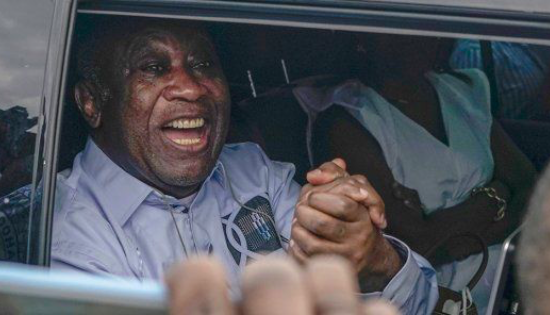The former president’s quick visit to Duékoué, as part of a major tour of the western part of the country, belongs to the latter category. Arriving on 8 April in the middle of the afternoon, the former president laid a wreath of flowers and paid his respects at the mass grave in the Carrefour district, before holding a meeting in front of thousands of people. He was accompanied by his wife Nady Bamba, several leaders from his party, the Parti des Peuple Africains – Côte d’Ivoire (PPA-CI), and a delegation from the Parti Démocratique de Côte d’Ivoire (PDCI).
In this city where one of the main killings attributed to pro-Ouattara forces took place in 2011, did Gbagbo hope to awaken old demons, as some critics have said? In his speech, the former president emphasised reconciliation. “Peace in Côte d’Ivoire will come from the Wé country because it is the Wé who have suffered the most,” he said.
The former president also questioned the reasons for the serious violence that occurred after the disputed November 2010 presidential election, without elaborating on his share of responsibility. “Today, I have come to cry, because what happened is unspeakable. […] For a small conflict, there are […] all these mass graves we visited, these many dead. I don’t understand, but I hope that one day I will. There was a moment when Côte d’Ivoire went mad and when Ivorians went mad. […] We cannot keep massacring each other over small issues […]. Post-election and even pre-election disputes exist in all countries. That is politics. But that is not why there are thousands of deaths. It’s because something went wrong,” he said.
800 victims
“Just because we are asking for peace and reconciliation doesn’t mean that we don’t want to know what happened in our country so that it does not happen again. The aim is not to stir the pot, but to learn from our mistakes. We must restore the facts and historical reality,” said Damana Pikass, the PPA-CI’s secretary-general.
Western Côte d’Ivoire was one of the regions that paid a heavy price during the crisis. The town of Duékoué, a strategic lock on the port of San Pedro, was the scene of a massacre that left its mark. As early as 2005, massacres had been perpetrated by armed militias in the districts of Petit Duékoué and Guitrozon.
Everything changed again between 29 and 31 March 2011, in the wake of the post-election crisis. Previously one of the pro-Gbagbo militias’ strongholds, this crossroads in western Côte d’Ivoire fell into the hands of the Forces Républicaines de Côte d’Ivoire (FRCI), which backed Alassane Ouattara. Houses were burned, huts looted, and men, women and children murdered. According to a report by the International Committee of the Red Cross (ICRC), men from the Moroccan contingent of the United Nations Operation in Côte d’Ivoire (ONUCI) counted 800 victims. The latter dug a mass grave in Carrefour, a district inhabited by the Guérés natives so that the bodies could be buried quickly.
Ouérémi found guilty
Since then, the victims have been demanding that justice be served. Charged with shedding light on the crimes that took place during the post-electoral crisis, the special investigation and prosecution unit divided its investigation into several sequences. An entire section was devoted to Duékoué’s capture by pro-Ouattara forces. In 2014, the International Federation for Human Rights (FIDH), which had joined other human rights organisations as a civil party, published a report detailing the responsibility of several warlords in these massacres, including Losseni Fofana, Eddie Médi and Amadé Ouérémi.
The article continues below

Free download
Get your free PDF: Top 200 banks 2019
The race to transform
Complete the form and download, for free, the highlights from The Africa Report’s Exclusive Ranking of Africa’s top 200 banks from last year. Get your free PDF by completing the following form
Arrested on 18 May 2013, the criminal court sentenced the Burkinabe warlord to life imprisonment in April 2021. He was found guilty of “crimes against the population”, “pillaging”, “kidnapping”, “assault and battery” and “destruction of property”. The court then followed the prosecutor’s recommendations against this former bicycle repairer born in 1964 in the central-western part of the country, who became a planter and then a feared trafficker leading a group of 100 men based in the Mount Péko forest.
Comzones out of reach
The trial nevertheless left a bitter taste in the mouths of human rights organisations. During the debates, Adamé Ouérémi had named the former comzone of Man, Losseni Fofana (aka “Loss”), and the FRCI’s former commander in Kouibly, Lieutenant Coulibaly (aka “Coul”), as his superiors. “I did not command, direct or give orders. I didn’t take out the guns, I didn’t give the bullets, I didn’t ask the Dozos [hunters] to help me,” he said on the stand. Despite this testimony, neither Fofana nor Coulibaly were heard at the trial. During their respective hearings, which the court’s president read out, they had stated that they did not know the accused before his arrest.
Like other former rebel leaders, even though Fofana was indicted in 2015 by the Ivorian justice system for his alleged role in crimes committed during the crisis, he did not go to trial. In 2018, Ouattara decreed an amnesty, which allowed several former comzones to escape justice. While none of them were named in the decision made by the Ivorian head of state, the crimes for which they were prosecuted were covered by this decision.
Since then, the procedure has been halted and Fofana has continued his rise in the army. In December 2021, he was promoted to the rank of colonel-major. After leading the Bataillon de Sécurisation de l’Ouest (BSO), he had been assigned in early 2019 to head Bouaké’s 3rd Military Infantry Battalion, thereby replacing Hervé Touré (aka “Vetcho”), another former zone commander of the Forces Nouvelles de Côte d’Ivoire (FNCI).

